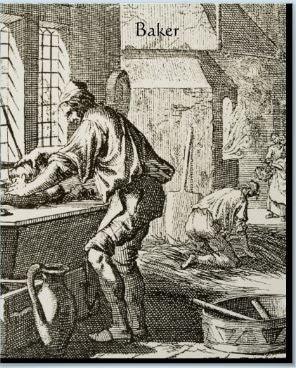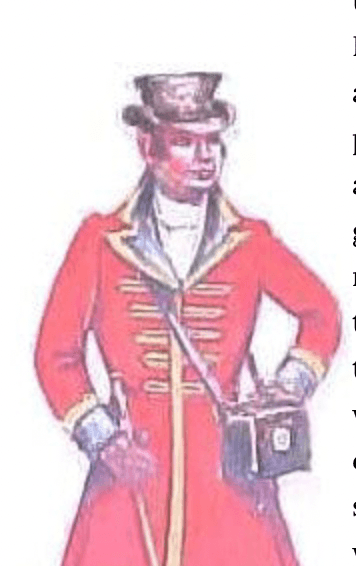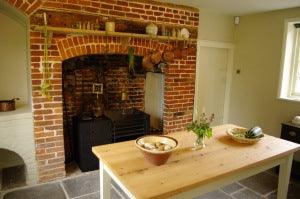
The Baker
Much could not be hoped from the traffic of even the busiest part of Highbury; -- Mr Perry walking hastily by, Mr William Cox letting himself in at the office-door, Mr Cole's carriage-horses returning from exercise, or a stray letter-boy on an obstinate mule, were the liveliest objects she could presume to expect; and when her eyes fell only on the butcher with his tray, a tidy old woman travelling homewards from shop with her full basket, two curs quarrelling over a dirty bone, and a string of dawdling children round the baker's little bow-window eyeing the gingerbread, she knew she had no reason to complain, and was amused enough; quite enough still to stand at the door. Emma
The chief art of the baker lies in making bread, rolls, and biscuits, and in baking various kinds of provisions. It is not known when this very useful business first became a particular profession. Bakers were a distinct body of people in Rome nearly two hundred years before the Christian era, and it is supposed that they came from Greece. To these were added a number of freemen, who were incorporated into a college, from which neither they nor their children were allowed to withdraw. They held their effects in common, without enjoying the power of parting with them.
Each bake house had a patron, who had the superintendancy of it; and one of the patrons had the management of the others, and the care of the college. So respectable were the bakers at Rome, that occasionally one of the body was admitted among the senators. Even by our own statutes the bakers are declared not to be handicrafts; and in London they are under the particular jurisdiction of the lord mayor and aldermen, who fix the price of bread, and have the power of finding these who do not conform to their rules. Bread is made of flour mixed and kneaded with yeast, water, and a little salt. It is known in London under two names, the white or wheaten, and the household: these differ only in degrees of purity; and the loaves must be marked with a W or H, or the Baker is liable to suffer a penalty.
The process of bread-making is thus described: --To a peck of meal are added a handful of salt, a pint of yeast, and three quarts of water, cold in summer and hot in winter, and temperate between the two. The whole being kneaded, as is represented in the plate, will rise in about an hour; it is then moulded into loaves, and put into the oven to bake. The oven takes more than an hour to heat properly, and break about three hours to bake. Most bakers make and sell rools in the morning: these are either common, or French rools: the former differ but little from loaf-bread: the ingredients of the latter are mixed with milk instead of water, and the finest flour is made use of for them. Rolls require only about twenty minutes for baking.
The life of a baker is very laborious; the greater part of his work is done by night: the journeyman is required always to commence his operations about eleven o’clock in the evening, in order to get new bread ready for admitting the rolls in the morning. His wages are, however, but very moderate, seldom amounting to more than ten shillings a week, exclusive of his board. The price of bread is regulated according to the price of wheat; and bakers are directed in this by the magistrates, whose rules they are bound to follow. By these the peck-loaf of each sort of bread must weight seventeen pounds six ounces avoirdupois weight, and smaller loaves in the same proportion. Every sack of flour is to weigh two hundred and a half and from this there ought to be made, at an average, twenty such peck-loaves, or eighty common quartern-loaves.
If bread were short in its weight only one ounce in thirty six, the baker formerly was liable to be put to the pillory; and for the same offence he may now be fined, at the will of the magistrate, in any sum not less than one shilling, nor more than five shillings, for every ounce wanting; such bread being complained of and weighed in the presence of the magistrate within twenty-four hours after it is baked, because bread loses in weight by keeping.
The process of biscuit-baking, as practiced at the Victualling-office at Deptford, is curious and interesting. The dough, which consists of flour and water only, is worked by a large machine. It is then handed over to a second workman, who slices it with a large knife for the bakers, of whom there are five. The first, or moulder, forms the biscuits two at a time; second, or marker, stamps and throws them to the splitter, who separates the two pieces, and puts them under the hands of the chucker, the man that supplies the oven, whose work of throwing the bread on the peel must be so exact, that he cannot look off for a moment. The fifth, or depositer, receives the biscuits on the peel, and arranges them in the oven. All the men work with the greatest exactness, and are, in truth, like parts of the same machine. The business is to deposit in the oven seventy biscuits in a minute; and this is accomplished with the regularity of a clock, the clacking of the peel operating like the motion of the pendulum.
There are 12 ovens at Deptford, and each of them will furnish daily bread for 2040 men. By referring to the plate, we see the baker represented in the act of kneading his dough the bin upon which he is at work contains the flour: on his right hand is the peel, with which he puts in and takes out the bread: at his back we see the representation of the fire in the oven, and in the front is the pain in which the yeast is fetched daily from the brewhouse; and by the side of the flour-bin on the ground is the wood used to heat the oven.
From The Book of Trades, or Library of Useful Arts published by Jacob Johnson, in 1807, with the original copper plate engraving.
Enjoyed this article? If you don't want to miss a beat when it comes to Jane Austen, make sure you are signed up to the Jane Austen newsletter for exclusive updates and discounts from our Online Gift Shop.




Leave a comment
This site is protected by hCaptcha and the hCaptcha Privacy Policy and Terms of Service apply.